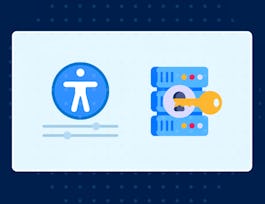Course 1 provides an overview of human factors, systems and human errors. It covers the key concepts and applications of human factors and introduces various methods for reducing human error.



What is the Human Factor in Design?
Ce cours fait partie de Spécialisation Human Factors & Usability Engineering: Designing for Humans

Instructeur : Robert Gray
Inclus avec 
Expérience recommandée
Ce que vous apprendrez
You will learn about human factors and will identify key human factors applications as well as compare and contrast methods for reducing human error.
Compétences que vous acquerrez
- Catégorie : Field of human factors
- Catégorie : Human Error Classification
- Catégorie : Human Systems Evaluation
Détails à connaître

Ajouter à votre profil LinkedIn
5 devoirs
Découvrez comment les employés des entreprises prestigieuses maîtrisent des compétences recherchées

Élaborez votre expertise du sujet
- Apprenez de nouveaux concepts auprès d'experts du secteur
- Acquérez une compréhension de base d'un sujet ou d'un outil
- Développez des compétences professionnelles avec des projets pratiques
- Obtenez un certificat professionnel partageable


Obtenez un certificat professionnel
Ajoutez cette qualification à votre profil LinkedIn ou à votre CV
Partagez-le sur les réseaux sociaux et dans votre évaluation de performance

Il y a 5 modules dans ce cours
In this course, you will explore the foundational concepts of human factors, the significance of a systems approach, and key human error types. The course provides the opportunity to learn strategies to reduce errors and optimize performance in various industries.
Inclus
2 vidéos1 lecture
In this module, you will be introduced to the field of human factors and its importance in understanding and reducing human error. You will learn about the basic concepts of human factors and how they are applied in various industries. You will also learn about the different types of human error and the factors that contribute to them. Lastly, you will explore the different methods for reducing human error and the importance of taking a systems approach. By the end of this module, you will have a good understanding of what human factors is and how it can be used to improve safety and performance in various industries.
Inclus
3 vidéos6 lectures2 devoirs
We have learned why, when, and how humans fail and how this can lead to catastrophic events. In Module 2, we will explore how we can reduce the frequency of human errors and, when they do occur, reduce their impact on our safety and well-being. Welcome to the field of “human factors,” where we use our understanding of what humans can and can’t do well to improve the design of all parts of the systems around us (e.g., transportation, medicine, education, etc.).
Inclus
3 vidéos4 lectures1 devoir1 sujet de discussion
In this module, we will delve into the different types of human error, exploring their underlying factors and the methods used to study them. By understanding the various categories of human error, we can better address their root causes and implement effective strategies to mitigate their impact on overall system performance. Through engaging examples, readings, and videos, you will learn how to identify, classify, and compare different human error types and the methods used to study them.
Inclus
3 vidéos4 lectures1 devoir1 sujet de discussion
While it may be impossible to eliminate human error completely, there are effective ways to reduce its occurrence and impact. In this module, we will explore various methods and strategies for minimizing human error in different contexts. By understanding and applying human factors principles, you'll learn how to identify potential sources of error and implement targeted interventions to mitigate their effects. Through engaging examples, readings, and videos, you will discover the tools and techniques necessary to improve system performance and safety by reducing human error.
Inclus
3 vidéos6 lectures1 devoir1 évaluation par les pairs
Instructeur

Offert par
Recommandé si vous êtes intéressé(e) par Mechanical Engineering

Arizona State University

University of North Texas

Microsoft

Board Infinity
Pour quelles raisons les étudiants sur Coursera nous choisissent-ils pour leur carrière ?





Ouvrez de nouvelles portes avec Coursera Plus
Accès illimité à 10,000+ cours de niveau international, projets pratiques et programmes de certification prêts à l'emploi - tous inclus dans votre abonnement.
Faites progresser votre carrière avec un diplôme en ligne
Obtenez un diplôme auprès d’universités de renommée mondiale - 100 % en ligne
Rejoignez plus de 3 400 entreprises mondiales qui ont choisi Coursera pour les affaires
Améliorez les compétences de vos employés pour exceller dans l’économie numérique
Foire Aux Questions
Access to lectures and assignments depends on your type of enrollment. If you take a course in audit mode, you will be able to see most course materials for free. To access graded assignments and to earn a Certificate, you will need to purchase the Certificate experience, during or after your audit. If you don't see the audit option:
The course may not offer an audit option. You can try a Free Trial instead, or apply for Financial Aid.
The course may offer 'Full Course, No Certificate' instead. This option lets you see all course materials, submit required assessments, and get a final grade. This also means that you will not be able to purchase a Certificate experience.
When you enroll in the course, you get access to all of the courses in the Specialization, and you earn a certificate when you complete the work. Your electronic Certificate will be added to your Accomplishments page - from there, you can print your Certificate or add it to your LinkedIn profile. If you only want to read and view the course content, you can audit the course for free.
If you subscribed, you get a 7-day free trial during which you can cancel at no penalty. After that, we don’t give refunds, but you can cancel your subscription at any time. See our full refund policy.

